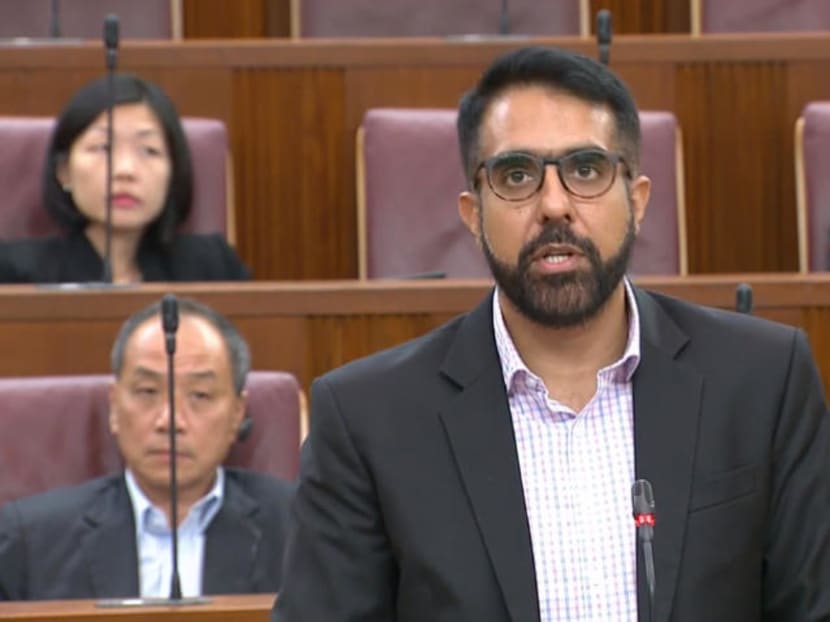Opposition’s role to ensure PAP doesn’t have ‘blank cheque to do whatever it wants’: WP chief Pritam Singh
SINGAPORE — Declaring that the role of the Opposition is to ensure that the People’s Action Party (PAP) does not have a “blank cheque to do whatever it wants”, Workers’ Party (WP) chief Pritam Singh said his party's aim of securing a third of parliamentary seats — which he first announced last year — is to have an “inherent checking mechanism… against any ruling party that chooses to put its political interests first”.

For the upcoming General Election, the Workers' Party will field candidates that “the public can envision to become competent MPs and Parliamentary backbenchers, and who will manage their town councils well”, Mr Pritam Singh said.
SINGAPORE — Declaring that the role of the Opposition is to ensure that the People’s Action Party (PAP) does not have a “blank cheque to do whatever it wants”, Workers’ Party (WP) chief Pritam Singh said his party's aim of securing a third of parliamentary seats — which he first announced last year — is to have an “inherent checking mechanism… against any ruling party that chooses to put its political interests first”.
Speaking to about 100 WP members at its annual members' forum on Sunday (Jan 19), Mr Singh brought up the example of the 2017 Presidential Election, which the Government reserved for candidates in the Malay community.
The WP secretary-general said that many minority Singaporeans he had spoken to — particularly those from the Malay community — did not see the need for a Malay president as a “particularly pressing concern”.
If the PAP has less than two-thirds of the seats in Parliament, it will have to “rationally persuade” Singaporeans, for example, that a rotation of races for the Elected Presidency is an urgent necessity that cannot wait, Mr Singh said.
“In my opinion, the urgency to amend the Elected Presidency was politically manufactured by the PAP. The real risk appeared to be Tan Cheng Bock’s potential participation in the last presidential election, and the election of a president who was unlikely to be the PAP’s preferred choice,” said Mr Singh in the speech, which was provided to the media by WP.
Prime Minister Lee Hsien Loong, in an interview with Mediacorp in September 2016, had rejected suggestions that the changes to the Elected Presidency, with the bar for the qualifying criteria raised significantly, were meant to keep out individuals whom the Government would find hard to work with.
“Even if I raise the standards, I cannot guarantee that nobody who is going to be difficult will become president,” said Mr Lee in an interview with Mediacorp.
“Wherever you cut off, there will be somebody, even a former minister or a former judge or somebody who may have run a very big company (who) may have his views and may clash with the Government.”
In Mr Singh’s speech, the WP chief recalled PM Lee’s comments to CNN in October last year, when he said that Singapore’s key test in the next decade or two is whether it has competent leadership that works for Singaporeans, rather than achieving the “right numerical balance” in Parliament.
At the last WP members’ forum on Jan 13, 2019, Mr Singh had said that the party’s “medium-term objective” is to win a third of the parliamentary seats.
“The numerical balance that the Prime Minister dismisses, on the contrary, absolutely counts because the PAP cannot change the constitution at its pleasure unless it has more than two-thirds of the seats in Parliament, like it can today,” he said.
“So the right numerical balance is not just a random number, it is an inherent checking mechanism in our parliamentary democracy against any ruling party that chooses to put its political interests first.”
The WP, which is Singapore’s main opposition party, currently has six elected seats in Parliament, out of a total of 89 seats. It also has three Non-Constituency Members of Parliament (NCMPs).
Based on the current total number, a third of parliamentary seats works out to about 30 elected seats.
WHAT THE OPPOSITION CAN’T DO
Mr Singh said that the WP is not in control of the national purse strings, which the PAP has loosened with the transition in 2016 of Temasek Holdings from contributing Net Investment Income to contributing Net Investment Returns — which is based on total expected returns rather than actual income only. That was a move the WP supported, he said.
However, the additional monies also give the PAP a “significant amount of latitude to do what all political incumbents do — calibrate and maximise the impact of any policy for political success”, Mr Singh added.
“So the question some of you hear during house visits from some Singaporeans... is what can the Opposition do for me?” he said.
“The direct answer is no Opposition in any parliamentary democracy anywhere in the world can, for example, pass Bills to introduce a minimum wage for low-income Singaporeans or directly ease cost of living burdens for the middle class.”
The Opposition also cannot release statistics on permanent residents in the economy and what the Government’s track record has been in ensuring that skills are transferred to Singaporeans over time, Mr Singh said.
“The Opposition’s role, in a democracy like Singapore or anywhere in the world, is different — it is to make sure that the ruling party does not have a blank cheque to do whatever it wants,” he asserted.
“More NCMP seats will not perform the checking role to induce the PAP to change its political course.
Join our Telegram channel to get TODAY's top stories on mobile:

“The opposition’s role is meaningful when voters elect an opposition with an elected mandate to speak for Singaporeans. An unelected opposition in Parliament cannot change the PAP.”
‘EARN OUR PLACE AND WORK HARD… TO RETAIN THE CONFIDENCE OF THE PEOPLE’
Aside from performing its role as a check and balance, the WP also has to earn its place and work hard both in its town councils and in Parliament to retain the people’s confidence and support, Mr Singh said.
“We must always strive for greater heights at the town council level to continue building the public’s confidence in alternate political leaders,” he said.
He added that the Aljunied-Hougang Town Council (AHTC) had performed well in this term of parliament, recording an operating surplus in excess of S$7 million. Of this amount, the WP is setting aside S$1 million to improve connectivity and amenities for residents.
Last October, the High Court found town councillors Sylvia Lim and Low Thia Khiang to have breached their fiduciary duties to the town council. WP has stated that it will appeal against the judgment.
AHTC said on Friday (Jan 17) it would comply with the Ministry of National Development’s order to restrict Ms Lim and Mr Low’s powers over financial matters.
For the upcoming General Election, the WP will field candidates that “the public can envision to become competent MPs and Parliamentary backbenchers, and who will manage their town councils well”, Mr Singh said.
The party’s focus, he said, will be on quality candidates from a range of backgrounds and life experiences.











